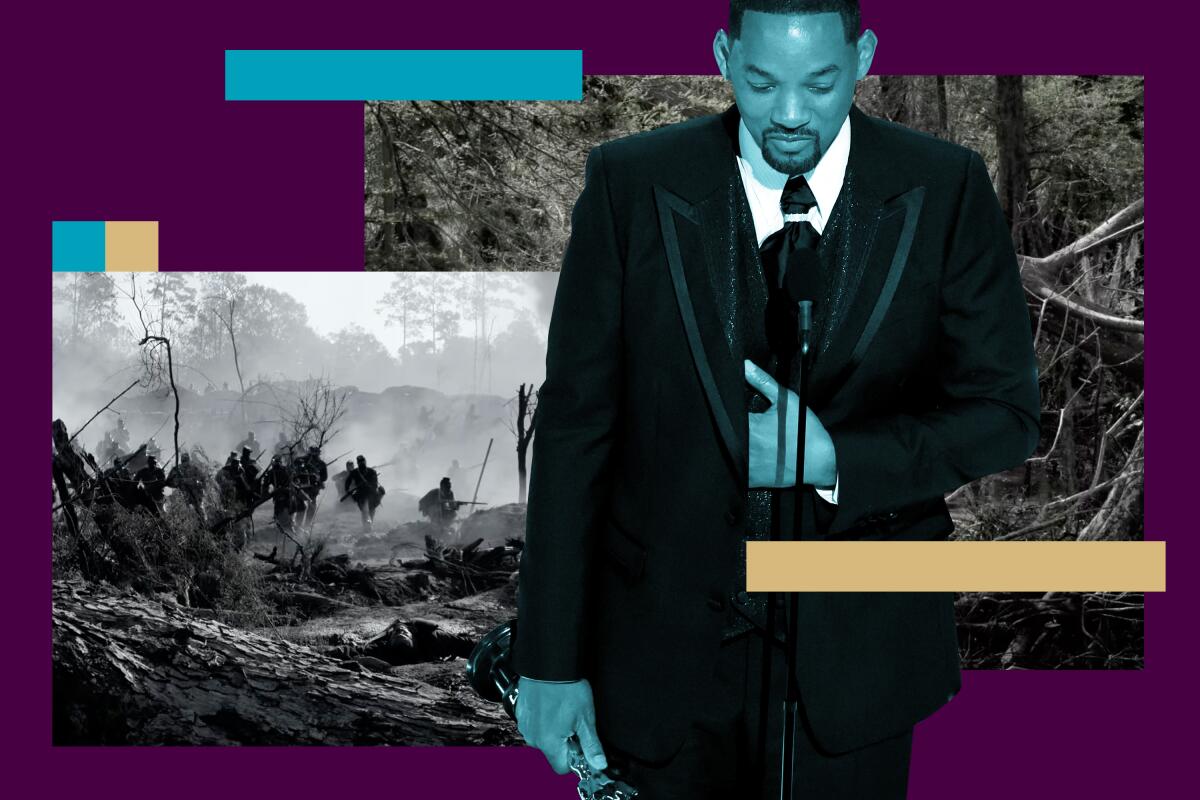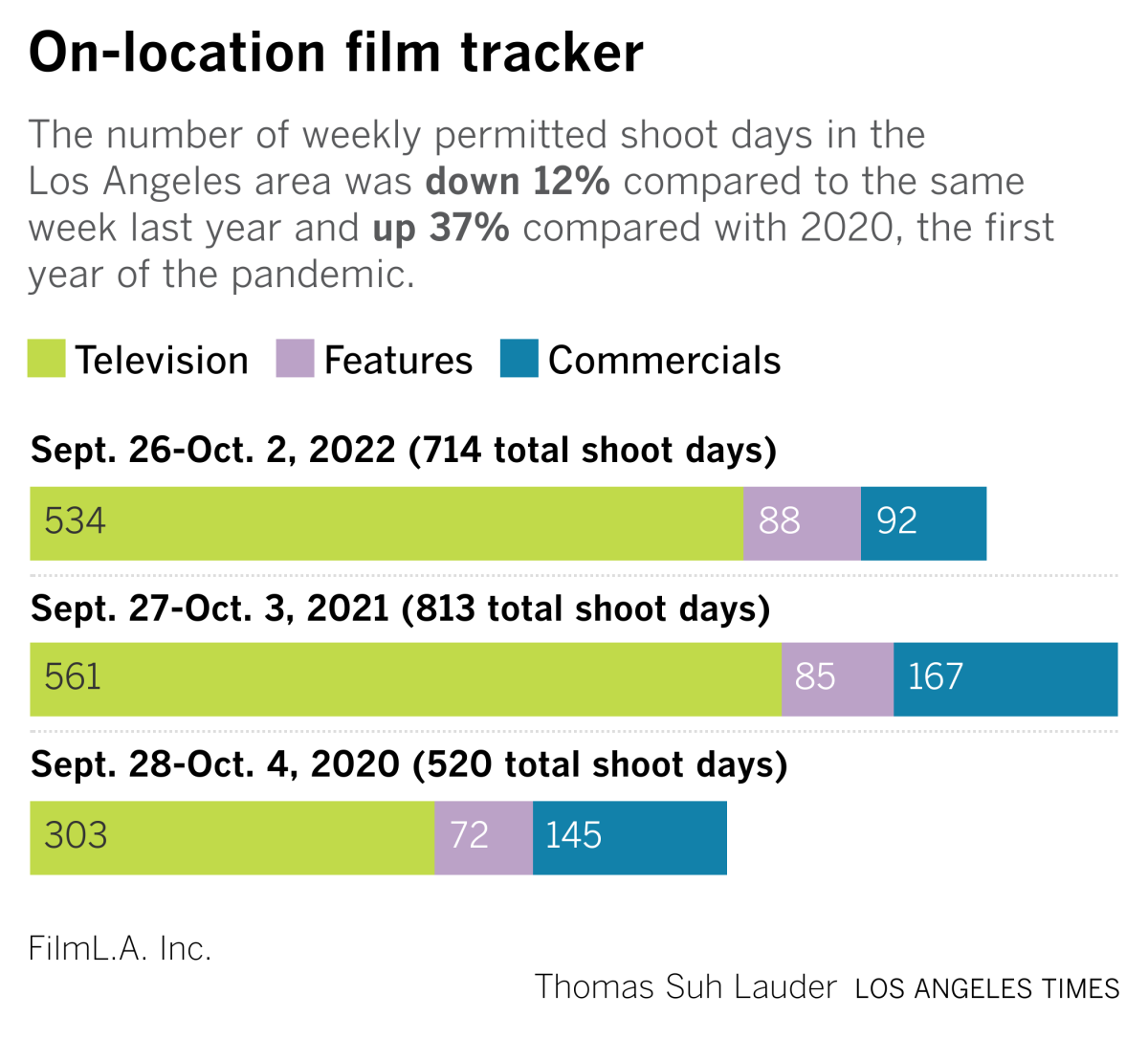Apple’s Will Smith Oscar gamble with ‘Emancipation’; Hollywood’s age of anxiety

- Share via
Welcome to the Wide Shot, a newsletter about the business of entertainment. Sign up here to get it in your inbox.
So.... How was your last month and a half? Anyone else experience a profound life change? One that has them and their partner staggering around like an extra in a George A. Romero movie?
Allow me to express my gratitude to my brilliant Company Town colleagues for covering newsletter duties while I got to know our new baby, Maxwell. And thank you to all the readers who sent their well wishes and film recommendations ahead of my leave of absence. “Parenthood,” the Ron Howard film starring Steve Martin, was a popular suggestion among Wide Shot subscribers, and a welcome one, albeit a tad on-the-nose.
Because we’re not married to our usual format, let’s start things off with...
Number of the week

Dec. 9, that is — the streaming release date Apple on Monday announced for its Will Smith slave thriller, “Emancipation.” Yes, that’s right, Apple, despite rampant speculation that “The Slap” would derail plans for the film, will release “Emancipation” this year after all, and in time for awards season, no less.
The Antoine Fuqua-directed picture will get a theatrical run starting Dec. 2, followed by its arrival on Apple TV+ a week later. Indeed, the movie will qualify for Oscars consideration, even though Smith won’t be able to attend the ceremony because of a 10-year ban as punishment for his onstage attack of Chris Rock at this year’s Academy Awards (he’s still eligible for a nomination if film academy voters feel so inclined).
There are many ways to overthink the possible explanations for this decision.
Perhaps Apple realized that the controversy surrounding Smith was unlikely to diminish everyday viewers’ interest in the movie, and may even have boosted its prospects. Holding it for a year probably wouldn’t help matters much, and with the $120-million picture ready to go, December is probably as good of a time as any to put it out into the world.
Unless you’ve got a “Top Gun: Maverick” on your hands, a long-delayed movie can feel stale when it finally comes out, especially one with the kind of political relevance that “Emancipation” has. Besides, people love a comeback story.
Let’s be real, though. These narratives are mostly noise to a company like Apple, which doesn’t operate like a normal studio but rather is focused on putting compelling stuff on Apple TV+ to keep customers using its products and services.
Apple seems confident that people will like the movie when they see it in theaters or on the streaming service. “Emancipation” held its first screening in Washington, D.C., over the weekend and the response was positive. That probably matters more than any other factor for the company, which doesn’t need its movies to be financially successful in a traditional sense. It doesn’t need the money, and it already has its best picture Oscar anyway, thanks to “CODA.”
“Emancipation” isn’t some piece of quiet Oscar bait, either. It’s a big, commercial movie. Speaking in front of an audience for the film, Smith described “Emancipation” as being not about slavery but about freedom and resilience.
Look, this is certainly a gamble in some ways. Yet it was clear from a recent New York Times story that Apple executives wanted to move ahead with the film this year. The only real question was when and how.
Apple representatives declined to comment beyond the firm’s media alert announcing the release date and teaser trailer.
The company rolled out the news with a lengthy Deadline Q&A with Fuqua, a sign that the Cupertino, Calif., giant isn’t going to shy away from a publicity push. How much Smith will figure into the pre-release press tour and awards campaign remains to be seen, though.
While the actor has made some public statements, including a video discussing the notorious Rock incident, he has yet to do a big “60 Minutes”-style interview or magazine profile for purposes of image rehab. The coming months will provide plenty of material for public relations case studies. It’ll be a fascinating test of the industry and the audience’s appetite for forgiveness.
High anxiety
I’ve been paying attention to industry matters really only out of the corner of my eye for the last few weeks. But indulge me this one observation. Last month was as good a time as any to not have to pay attention to the movie industry, for the sake of mental health, if nothing else. I’m only halfway kidding.
After months of mounting optimism for the recovery of theatrical film, a couple headlines underscored the overall state of the industry.
First, Cineworld, the British owner of the Regal cinema chain, filed for Chapter 11 bankruptcy protection in the U.S., citing the lingering financial devastation from the COVID-19 pandemic and a weaker-than-expected film slate.
Adding to the gloomy mood, Cineworld projected in a recent financial update that 2023 and 2024 admissions would remain below pre-pandemic levels. That may seem obvious, given the way studios have shifted a significant portion of their filmmaking efforts to streaming. But seeing the world’s second-largest theater operator acknowledge that in writing was a reality check. And now Disney has removed a “Star Wars” film from the calendar? That doesn’t help.
Then there was this: The domestic box office was clobbered with the worst September since 1996, more than a quarter century ago, excluding the lost year of 2020. That’s not even accounting for inflation. Yikes.
No wonder people seem so stressed.
If fact, one could make a convincing case that “anxiety” has become the word of the year for 2022, in the way that “disruption” was the defining term of the last three to five years. Before that, “convergence,” referring to the merging of Silicon Valley and Hollywood, was king of the buzzwords.
Vanity Fair last week published a piece by Natalie Jarvey that captured the “existential dread” and overall sense of burnout and frustration amid what former Disney Chief Executive Bob Iger has called an “age of great anxiety.” A headline from the Ankler, acting as the industry’s mood ring, suggested that we’d hit “peak anxiety.” Wait, isn’t this business supposed to be fun?
Warner Bros. Discovery CEO David Zaslav has contributed mightily to this high-strung age with layoffs and an overhaul of the company’s content strategy that has left creators scrambling. Zaslav recently told staff that the company he just took over was “absolutely” not for sale. Comforting!
Zaslav aside, the industry has plenty to fret about. A potentially devastating writers strike looming in the future. The collapse of linear TV. Fights over how talent and workers can share in the riches from the surge in demand for streaming content, as my colleague Anousha Sakoui recently covered for this newsletter. Corporate headaches over whether streaming is actually a good way to make money, following Netflix’s correction.
I’ll say this much. Hollywood managed to keep things interesting while I was gone, even with its current extended drought of hits.
The publicity tour for “Don’t Worry Darling” provided intrigue but caused no observable damage or benefit for the film’s financial prospects. It achieved its fairly decent $19-million opening weekend by following the same playbook studios have used since the days of the silent movie matinee idols: put the hot guy on the big screen. In this case, Harry Styles.
Every attempt of inclusion in the most escapist of our entertainments — a Black mermaid, a Puerto Rican elf, a gay romcom — became a target for bigots online.
The dismal $4.8-million opening weekend for “Bros” marked yet another disaster for the state of theatrical comedy.
Disney, having committed more than any of the traditional studios to using its moviemaking prowess to convert streaming subscribers, turned heads by releasing an all-too-rare sleeper hit, the R-rated horror film “Barbarian,” in theaters.
The company’s decision to scrap a Don Cheadle Marvel show for Disney+ and instead redevelop it as a movie got some people (including Sonny Bunch) speculating that Disney had seen the error of leaving hundred of millions in box office revenue on the table. Put another way, this seems like an example of the kind of flexible planning that Bob Chapek has been talking about since the big Disney reorganization.
It’s as if, 2½ years after the pandemic broke the business model, everyone’s still kind of just trying to figure out what comes next.
But we’re not all about the doomsaying here. To close on a high note, Nicole Kidman’s beloved AMC Theatres commercial, perhaps the defining piece of movie culture content from the pandemic era, received the “Saturday Night Live” treatment with a scarily accurate parody starring Chloe Fineman.
As Fineman demonically levitated and as patrons stood to salute while cultishly chanting “heartbreak feels good in a place like this,” this thought crossed my mind: At least someone is having a good time.
Stuff we wrote
— What’s it like being the lone liberal on Fox News? Stephen Battaglio profiles Jessica Tarlov, the co-host of “The Five,” a rare voice of dissent in an increasingly partisan and doctrinaire media landscape.
— What’s going on with the “Rust” investigation? Anousha Sakoui analyzes the key takeaways from “Rust” prosecutors’ request for emergency funding. Charges appear imminent.
— The trouble with Triller. As the video app and TikTok rival prepares to go public, Brian Contreras and Wendy Lee dig into the lawsuits that have faced the firm.
— ICYMI: SEC sues former MoviePass executives for alleged fraud and misleading investors. Warner Bros. Discovery faces suit alleging inflated HBO Max numbers. Lionsgate looks to spin off film and TV studio, instead of Starz. Lynette Romero lands at KNBC after tumultuous KTLA departure.
Films shoots
Los Angeles-area on-location shoots were down 12% from the same week a year ago, according to data from FilmLA.

Latino diversity push
My colleague Wendy Lee writes: As Hollywood looks to diversify its ranks, there’s an increasing effort by studios to support high school students from underrepresented communities, giving them exposure to inspire them to pursue careers in entertainment.
Amazon says it is partnering with the Latino Film Institute, and the tech giant is the exclusive sponsor of the Youth Cinema Project Alumni Program for the 2022-23 school year, which connects more than 300 program graduates with learning opportunities and mentorship. Amazon said it will fund a YCP fellowship, where 15 college-bound high school students will work on a short film that will screen at the Los Angeles Latino International Film Festival next year.
“This is gonna give young people an opportunity to really compete for film schools in a real way,” said Latasha Gillespie, global head of diversity, equity, inclusion and accessibility for Amazon Studios, in an interview. “To have your project screened at a film festival at such a young age, just that whole process and experience is going to make them that much more prepared.”
Best of the web...
— Dragons versus elves: Who has the better release strategy? (Vulture)
— Andrew Dominik’s, uh, revealing interview on Netflix’s NC-17 “Blonde.” (Sight & Sound)
— Does seeing Billy Eichner’s “Bros” have to be marketed as a political act? (Slate)
— The search for the perfect sound in music’s Digital Age. (Washington Post)
Finally ...
I agree with Ada Tseng’s Essential California newsletter headline: We Don’t Appreciate Stunt Performers Enough. Tseng spoke with coordinators and performers including Alex Daniels, who was David Hasselhoff’s double on “Baywatch,” about this frequently overlooked part of the filmmaking process and how aspiring workers can enter the profession.
Inside the business of entertainment
The Wide Shot brings you news, analysis and insights on everything from streaming wars to production — and what it all means for the future.
You may occasionally receive promotional content from the Los Angeles Times.




